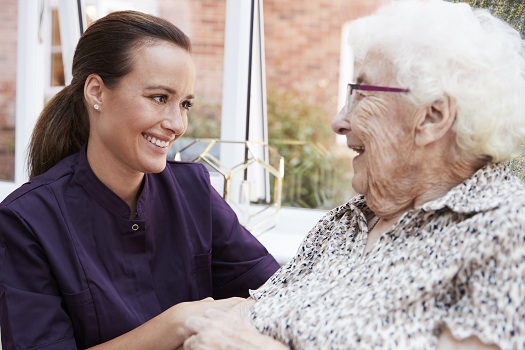Stroke is the leading cause of death among older adults. After having strokes, many seniors experience limited mobility, and some could have permanent disabilities. Here are some steps you and your aging loved one can take after a stroke to prevent it from happening again.
Use Effective Communication
Many seniors lose the ability to speak after a stroke. Your loved one may have slurred speech, depending on the extent of the damage. Don’t speak loudly when communicating with your loved one. Speak directly to your parent when having a conversation, and make sure he or she doesn’t strain when communicating with you. Stress and exertion at a time when your loved one has low energy levels can lead to another stroke or other health issues.
Encourage a Healthy Diet
Following a healthy diet can help your loved one recover from a stroke and possibly prevent another one from occurring. High cholesterol levels, obesity, and hypertension are all risk factors associated with a stroke. However, eating a diet low in sodium and calories can help your loved one recover. Here are some foods seniors should incorporate into their diets after a stroke:
- Vegetables and fruits
- Lean meats and poultry
- Whole-grain foods
- High-fiber foods
- Low-fat dairy products
In Barrie, at-home care providers can benefit aging adults in a variety of ways. From cooking nutritious meals to offering timely medication reminders, the dedicated caregivers at Home Care Assistance are available to help your elderly loved one 24 hours a day, 7 days a week.
Help Your Loved One Maintain Focus
After having a stroke, your loved one’s brain needs to recover. Certain things in life may cause confusion. The extent of the damage will determine how long it takes the brain to return to normal. Limit the number of distractions surrounding your loved one. For instance, the radio shouldn’t be on if your loved one is watching television because it could increase the chances he or she will become confused and irritated. Make sure your loved one focuses on one thing at a time.
Assist with Physical Activity
Even though the stroke may limit your loved one’s movement, he or she will need to begin exercise routines as soon as the doctor gives approval. The area of the body that has been affected by the stroke should be the target of the exercise routine. For instance, if your loved one has lost mobility in an arm, he or she will need to develop an exercise routine and techniques to help it recover. Your loved one can try passive movements and exercises to gain full mobility in the arm. The goal of exercising post-stroke is to help your loved one enhance muscle control while reducing spasticity.
A professional caregiver can help your loved one establish an exercise routine and make other healthy lifestyle changes after a stroke. Families looking for top-rated elder care providers can reach out to Home Care Assistance. From respite care to specialized Alzheimer’s, dementia, stroke, and Parkinson’s care, there are many ways we can make life easier for seniors and their loved ones.
Prevent Depression
Your loved one could experience depression after a stroke because of the limited ability to communicate, move, or perform other normal functions. Depression can trigger another stroke because it increases stress levels, which prevents the flow of blood and oxygen to the brain. Encourage your loved one to join a support group while recovering from a stroke. You can also invite family and friends over to lift your loved one’s spirits and prevent depression.
Recovering from a stroke, managing the symptoms of Alzheimer’s, and a variety of other health-related situations can make it difficult for a senior to continue living at home without someone there to help. Barrie, ON, live-in care professionals are trained to help seniors who need 24/7 assistance. With the help of a live-in caregiver, your elderly loved one can maintain a higher quality of life while aging in place. Trust your loved one’s care to the professionals at Home Care Assistance. Reach out to one of our compassionate Care Managers today at 647-970-3803.
